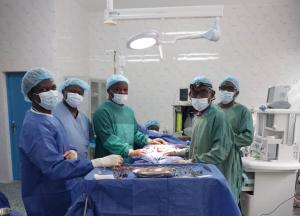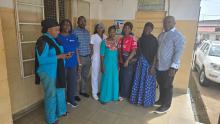Strengthening cervical cancer surgical capacity in Sierra Leone through south-south collaboration
Freetown, Sierra Leone – Sierra Leone has taken another step forward in strengthening national capacity for cervical cancer care through the successful completion of a second round of complex surgical procedures for women diagnosed with early-stage invasive cervical cancer.
Four women underwent surgery at the Princess Christian Maternity Hospital (PCMH) in June 2025, supported by the Ministry of Health in partnership with the World Health Organization (WHO) and a South-South collaboration with Ministry of Health, Zambia. This builds on the foundation laid in 2024, when three women received gynecologic oncology surgeries of this kind in the country.
This latest intervention was led by a visiting gynecologic oncologic surgeon from Zambia, who worked alongside local teams, offering hands-on mentorship and support. National health professionals gained practical experience and surgical skills, contributing to long-term efforts to integrate cervical cancer services into Sierra Leone’s health system.
Dr. Michael Ezeanochie, a consultant at PCMH who participated in both rounds of surgeries, emphasized the importance of continued mentorship: As a consultant, I’ve seen firsthand how ongoing mentorship not only builds local surgical capacity but also ensures the sustainability of life-saving interventions for women,” he said.
The team also followed up with the three women who underwent surgery in 2024. They are doing well and continue to be monitored by clinical teams. These follow-up visits are critical for ensuring post-surgical care, assessing outcomes, and guiding future interventions.
Ramatulai Kamara, a 43-year-old woman who benefited from surgery in 2024, shared her experience during the follow-up: “Since the surgery last year, I feel like I’ve regained my life. I was in pain for so long, and I didn’t know if I could ever live without it. But now, I’m back to my daily routine, I’m active, and I’m grateful. I’m so thankful for the doctors, and I feel like I’ve been given a second chance.
Dr. George Ameh, WHO Representative in Sierra Leone, highlighted the importance of the initiative in the broader context of WHO’s cervical cancer elimination strategy:
“This is an important step toward the 90-70-90 targets. We are encouraged by the growing capacity of national teams and remain committed to supporting the Ministry of Health in building a sustainable cervical cancer programme.”
Essential surgical instruments donated by the Friends of Africa Inc (FOA). have made it possible to perform radical hysterectomies and other procedures safely and efficiently. With continued support, the Ministry of Health aims to scale up surgical services, improve screening and early diagnosis, and integrate care into routine health services.
Dr. Samson Chisele, the gynecologic oncologist from Zambia who led both rounds of surgeries, reflected on the collaboration:
“We share not only clinical knowledge but also a common commitment to improving women’s health across our region. It is a privilege to support Sierra Leone as it builds national expertise in cervical cancer care.”
As cervical cancer screening continues to expand nationally through Visual Inspection with Acetic Acid (VIA), more women with early-stage disease are being identified and offered care. The recent surgical initiative demonstrates that with the right training, tools, and collaboration, meaningful progress is possible.
One beneficiary, Grace Bangura, shared her personal experience:
“I never imagined I could get this kind of surgery in my own country. The pain I was feeling was unbearable, but today I feel hopeful. The doctors supported me through everything, and I want to tell other women, don’t be afraid. Come forward, get screened, get treated. You are not alone.”
This effort represents a practical example of how shared expertise and regional solidarity can contribute to stronger health systems and improved outcomes for women in low-resource settings.

